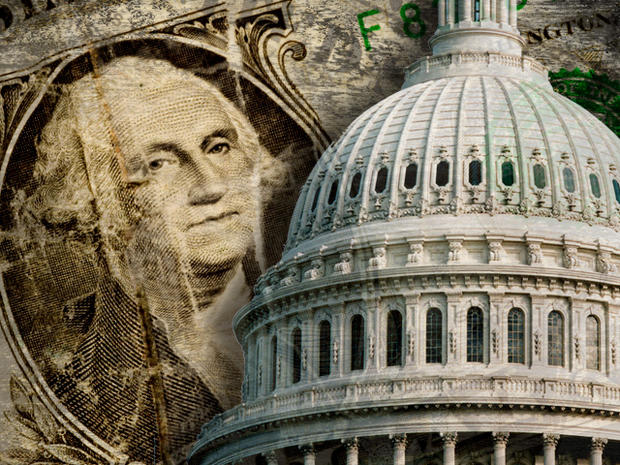Downgrade puts new pressure on debt "super committee"
As part of Washington's debt deal, Congress has decided to form a congressional "super committee" with the daunting mandate of finding at least around $1.2 trillion in deficit cuts by the end of the year. The soon-to-be formed committee may find itself under even more pressure, now that rating agency Standard and Poor's has downgraded America's credit because of both deficit problems and apparent political turmoil.
Politicians in Washington over weekend said that the credit downgrade gives the super committee's work new urgency, but at the same time, they seemed more motivated than ever to stay entrenched in political gridlock.
Both Democrats and Republicans told the New York Times this weekend that the S&P report could give Congress new motivation to accept the proposal of the 12-member, bipartisan "super committee." Leaders must appoint members of the committee by August 16, and it is required to vote on a budget-savings plan by November 23.
Special section: America's debt battle
The downgrade creates "a sense of urgency for the two parties to come together," Rep. Steve Southerland, R-Fla. told the Times, adding that the possibility of a further downgrade "scares" him. Added Rep. Blake Farenthold, R-Texas, "Anything that encourages the new committee to get the job done and get us back on a rational fiscal path is a good thing."
At least some lawmakers called on Congress to return from its August recess to take up more deficit-reduction legislation.
"I sent a letter today to Leader Cantor requesting we come back to DC to resolve our deficit and spending issues. We should be in session!" Rep. Allen West, R-Fla., tweeted. West, a Tea Party-aligned House member, gained attention for his early support of the debt deal Republican leaders agreed to with President Obama.
Similarly, Rep. Jack Kingston, R-Ga., said in a statement that "Congress should immediately reconvene to take up the fundamental reforms necessary to right the ship and lay the groundwork for a more stable and secure future for our children and grandchildren."
As Frank noted, there's reason to believe the partisan fighting that S&P cited in its downgrade will continue in the super committee.
In a post on House Majority Leader Eric Cantor's blog, Cantor aide Brian Patrick suggested Republicans will remain opposed to any revenue increases -- a huge point of contention during the debt ceiling debate.
"Instead of bashing a rating agency, the president should finally recognize that our country faces an unsustainable debt situation and it will take real reforms, spending cuts and meaningful changes to fix it and get our economy going again," the blog post said. "It is time for the president and his party to join us on common sense measures to bring down our debt and boost long-term economic growth and job creation without raising taxes on working families and small businesses."
On "Fox News Sunday," Rep. Paul Ryan, R-Wis., said the S&P report validated the House passage of the GOP 2012 budget, which Ryan wrote and Democrats railed against as too extreme.
"To me, this is just more vindication of our actions," he said. "We passed a budget, which according to someone with S&P yesterday, would have prevented the downgrading from happening in the first place."
At least seven of the 12 "super committee" members will have to agree to their budget plan in order for it to move to the whole Congress. Even if it meets its mandate of coming up with $1.2 trillion to $1.5 trillion in savings, that may not be good enough for S&P -- the rating agency said it wanted Washington to reduce the deficit by around $4 trillion. S&P's managing director, John Chambers, said on ABC's "This Week" on Sunday that there's a one in three chance that the U.S. credit rating could be downgraded another notch if the political gridlock continues or the nation's fiscal condition declines further.
Who's to blame for S&P's U.S. credit rating downgrade?Dems, GOP react to debt downgrade
Treasury Dept.: Downgrade flawed by $2-Trillion error





